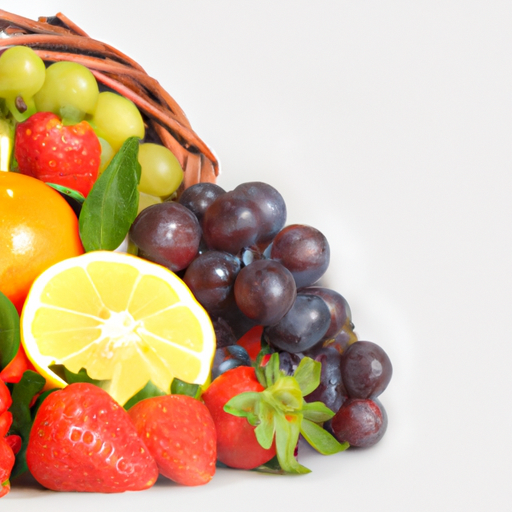In this article, you will learn some practical tips on how to maintain a balanced diet for good health. Having a balanced diet is important as it ensures that your body gets all the nutrients it needs to function properly. Eating a variety of foods from different food groups can help you achieve this balance.
To maintain a balanced diet, it is essential to include a variety of fruits, vegetables, whole grains, lean proteins, and healthy fats in your meals. Aim to have at least five servings of fruits and vegetables each day, as they are packed with essential vitamins and minerals. Try to incorporate whole grains like brown rice, quinoa, or whole wheat bread, as they are rich in fiber and provide long-lasting energy. Additionally, choose lean sources of protein such as chicken, fish, beans, or tofu, and include healthy fats like avocados, nuts, and olive oil in moderation.
Remember, maintaining a balanced diet is not about depriving yourself of certain foods but rather about making healthy choices and finding the right balance. By following these simple tips, you can improve your overall health and well-being and ensure that your body receives the nutrients it needs to thrive.

Importance of a balanced diet
Maintaining a balanced diet is crucial for overall good health. A balanced diet provides your body with the necessary nutrients, vitamins, and minerals it needs to function at its best. It helps prevent chronic diseases, boosts the immune system, improves digestion, promotes weight management, and enhances overall well-being. In this article, we will discuss the importance of a balanced diet, understand macronutrients, explore the components of a balanced diet, learn about portion control and meal planning, emphasize the importance of hydration, and provide tips on avoiding processed foods and practicing healthy snacking.
Nutritional needs
When it comes to nutrition, everyone’s needs vary based on factors such as age, gender, weight, and activity level. However, there are some basic nutritional needs that apply to everyone. These include carbohydrates, proteins, fats, vitamins, minerals, and fiber. A balanced diet ensures that you are consuming all the necessary nutrients in appropriate quantities.
Benefits of a balanced diet
A balanced diet offers numerous benefits for your overall health. It not only provides the energy necessary for daily activities but also helps regulate metabolism, improve cognitive function, maintain a healthy weight, and reduce the risk of chronic diseases such as heart disease, diabetes, and obesity. Additionally, a balanced diet supports a strong immune system and aids in the body’s natural healing and recovery processes.
Understanding macronutrients
Macronutrients are the nutrients required by the body in larger quantities. These include carbohydrates, proteins, and fats. Each macronutrient plays a different role in maintaining your health and well-being.
Carbohydrates
Carbohydrates are the body’s primary source of energy. They are found in foods such as bread, pasta, rice, fruits, and vegetables. It is important to choose complex carbohydrates, which provide a slow and steady release of energy, over simple carbohydrates like refined sugars.
Proteins
Proteins are the building blocks of the body, responsible for repairing and building tissues, making enzymes and hormones, and supporting a healthy immune system. They can be found in foods such as meat, fish, eggs, legumes, and dairy products. It is important to include a variety of protein sources in your diet to ensure you are getting all the essential amino acids your body needs.
Fats
Fats are an essential part of a balanced diet, providing energy, aiding in the absorption of vitamins A, D, E, and K, and helping to maintain healthy skin and hair. They can be found in foods such as avocados, nuts, seeds, oils, and fatty fish. It is important to choose healthy fats, such as monounsaturated and polyunsaturated fats, over unhealthy saturated and trans fats.

Components of a balanced diet
To maintain a balanced diet, it is important to include a variety of food groups in your meals. Here are some key components of a balanced diet:
Fruits and vegetables
Fruits and vegetables are rich in vitamins, minerals, antioxidants, and fiber. They should make up a significant portion of your daily food intake. Aim to include at least five servings of fruits and vegetables each day. These can be consumed fresh, frozen, or cooked.
Whole grains
Whole grains are a great source of fiber, vitamins, minerals, and antioxidants. They can help regulate blood sugar levels, improve digestion, and promote heart health. Include foods such as whole wheat bread, brown rice, quinoa, and oats in your diet as a healthier alternative to refined grains.
Lean proteins
Lean proteins are essential for muscle growth and repair. They are low in saturated fats and cholesterol and can be found in foods such as chicken, turkey, fish, tofu, and legumes. Lean proteins should be included in every meal to ensure adequate protein intake.
Healthy fats
Including healthy fats in your diet is important for heart health and overall well-being. Opt for sources such as avocados, nuts, seeds, olive oil, and fatty fish like salmon. These fats provide essential fatty acids and fat-soluble vitamins.
Portion control
Maintaining portion control is essential for a balanced diet. It is not only about choosing nutritious foods but also about consuming them in the right quantities. Here are some tips for balancing calorie intake and managing portion sizes:
Balancing calorie intake
To maintain a healthy weight, it is important to balance the number of calories you consume with the number of calories you burn. This can be achieved by choosing nutrient-dense foods that offer a lot of nutrition for relatively few calories.
Serving sizes
Understanding proper serving sizes is crucial for portion control. Pay attention to recommended serving sizes on food labels and use measuring cups or a food scale to accurately portion out your food. It can be helpful to visualize serving sizes in terms of everyday objects or compare them to your hand or a deck of cards.

Eating a variety of foods
Eating a variety of foods is key to a balanced diet. Here are some benefits of diversity and tips for including all food groups in your meals:
Benefits of diversity
No single food can provide all the necessary nutrients your body needs. Eating a variety of foods ensures that you get a wide range of vitamins, minerals, and antioxidants. It also makes your meals more enjoyable and prevents boredom with your diet.
Including all food groups
To ensure a balanced diet, aim to include foods from all food groups in your daily meals. This includes fruits, vegetables, whole grains, lean proteins, and healthy fats. By including foods from each group, you can ensure that you are getting a good mix of nutrients.
Meal planning
Meal planning is a great way to ensure that you are maintaining a balanced diet throughout the week. Here are some tips for creating balanced meals and staying organized:
Creating balanced meals
When planning your meals, aim to include a variety of food groups in each dish. For example, a balanced meal could include a lean protein, a whole grain, and a serving of vegetables. Be mindful of portion sizes and try to include a rainbow of fruits and vegetables to maximize nutritional benefits.
Preparation and organization
Spend some time each week preparing and organizing your meals. This can include washing and cutting fruits and vegetables, pre-cooking grains and proteins, and packaging them into portions for easy grab-and-go meals. This will not only save you time during the week but also ensure that you have nutritious options readily available.

Hydration
Staying hydrated is essential for overall good health. Water is involved in numerous bodily functions, such as digestion, nutrient absorption, temperature regulation, and waste removal. Here’s why hydration is important and how much you should aim to drink:
The importance of water
Water is vital for your body to function properly. It helps maintain healthy bodily fluids, lubricates joints, aids in digestion, and supports healthy skin. Dehydration can lead to fatigue, headaches, decreased cognitive function, and impaired physical performance.
Recommended daily intake
The recommended daily water intake varies depending on factors such as age, weight, activity level, and climate. A general guideline is to aim for at least 8 cups (64 ounces) of water per day. However, this may need to be adjusted based on individual needs. Remember to drink water throughout the day to stay properly hydrated.
Avoiding processed foods
In order to maintain a balanced diet, it is important to limit or avoid processed foods. Here’s why and how to make healthier choices:
Hidden sugars and additives
Processed foods often contain high levels of added sugars, unhealthy fats, and additives. These ingredients can contribute to weight gain, inflammation, and an increased risk of chronic diseases. Read food labels carefully and opt for whole, unprocessed foods whenever possible.
Making healthier choices
Instead of reaching for processed snacks and convenience foods, choose whole foods as often as possible. Opt for homemade meals made with fresh ingredients, snack on fruits and vegetables, and prepare your own sauces and dressings to control the quality of ingredients. Making these small changes can have a big impact on your overall health.

Healthy snacking
Snacking can be a part of a balanced diet if done correctly. Here are some tips for choosing nutritious options and practicing smart snacking strategies:
Choosing nutritious options
When it comes to snacking, opt for nutrient-dense foods that provide sustained energy and offer health benefits. Include snacks such as fruits, vegetables, nuts, seeds, yogurt, and whole grain crackers. These choices are rich in vitamins, minerals, fiber, and healthy fats.
Smart snacking strategies
Practice portion control when snacking by pre-portioning snacks into small containers or bags. This can prevent mindless eating and help you stay on track with your dietary goals. It can also be helpful to plan your snacks ahead of time and have them readily available, so you are less likely to reach for unhealthy options when hunger strikes.
Conclusion
Maintaining a balanced diet is essential for good health. By understanding the importance of a balanced diet, including all necessary macronutrients, incorporating a variety of foods, practicing portion control, meal planning, staying hydrated, avoiding processed foods, and practicing healthy snacking, you can improve your overall well-being and reduce the risk of chronic diseases. It may take time and effort to adjust your eating habits, but the benefits of a balanced diet will far outweigh the initial challenges. Commit to making small, sustainable changes to your diet and enjoy the long-term benefits of good health and vitality. Your body will thank you for it!

